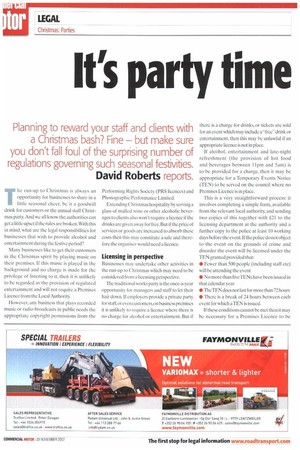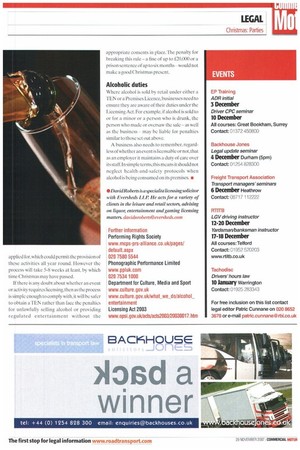Ifs party time
Page 40

Page 41

If you've noticed an error in this article please click here to report it so we can fix it.
Planning to reward your staff and clients with a Christmas bash? Fine — but make sure you don't fall foul of the surprising number of regulations governing such seasonal festivities.
David Roberts reports.
The run-up to Christmas is always an opportunity for businesses to share in a little seasonal cheer, be it a goodwill drink for customers or the annual staff Christmas party. And we all know the authorities can get a little upset if the rules are broken.With this in mind, what are the legal responsibilities for businesses that wish to provide alcohol and entertainment during the festive period?
Many businesses like to get their customers in the Christmas spirit by playing music on their premises. If this music is played in the background and no charge is made for the privilege of listening to it, then it is unlikely to be regarded as the provision of regulated entertainment and will not require a Premises Licence from the Local Authority.
However, any business that plays recorded music or radio broadcasts in public needs the appropriate copyright permissions from the Performing Rights Society (PRS licences) and Phonographic Performance Limited.
Extending Christmas hospitality by serving a glass of mulled wine or other alcoholic beverages to clients also won't require a licence if the drinks are given away for free. But if the price of services or goods are increased to absorb these costs then this may constitute a sale and therefore the organiser would need a licence.
Licensing in perspective Businesses may undertake other activities in the run-up to Christmas which may need to be considered from a licensing perspective.
The traditional works party is the once-a-year opportunity for managers and staff to let their hair down, If employers provide a private party for staff. or even customers, on business premises it is unlikely to require a licence where there is no charge for alcohol or entertainment. But if there is a charge for drinks, or tickets are sold for an event which may include a "free" drink or entertainment, then this may be unlawful if an appropriate licence is not in place.
If alcohol, entertainment and late-night refreshment (the provision of hot food and beverages between 11 pm and Sam) is to he provided for a charge, then it may be appropriate for a Temporary Events Notice (TEN) to be served on the council where no Premises Licence is in place.
This is a very straightforward process: it involves completing a simple form, available from the relevant local authority, and sending two copies of this together with £21 to the licensing department at the authority and a further copy to the police at least 10 working days before the event. If the police do not object to the event on the grounds of crime and disorder the event will be licensed under the TEN granted provided that: • Fewer than 500 people (including staff etc) will be attending the event • No more than fiveTENs have been issued in that calendar year • TheTEN does not last for more than 72 hours • There is a break of 24 hours between each event for which a TEN is issued.
If these conditions cannot be met then it may be necessary for a Premises Licence to be applied for,which could permit the provision of these activities all year round. However the process will take 5-8 weeks at least, by which time Christmas may have passed.
If there is any doubt about whether an event or activity requires licensing,then as the process is simple enough to comply with, ii will be safer to obtain a TEN rather than face the penalties for unlawfully selling alcohol or providing regulated entertainment without the appropriate consents in place. The penalty for breaking this rule a fine of up to £20,000 or a prison sentence of up to six months-would not make a good Christmas present.
Alcoholic duties Where alcohol is sold by retail under either a TEN or a Premises Licence, businesses need to ensure they are aware of their duties under the Licensing Act. For example, if alcohol is sold to or for a minor or a person who is drunk, the person who made or oversaw the sale as well as the business may be liable for penalties similar to those set out above.
A business also needs to remember, regardless of whether an event is licensable or not, that as an employer it maintains a duty of care over its staffin simple terms,this means it should not neglect health-and-safety protocols when alcohol is being consumed on its premises.
illWavidRobertsisaspecialistlicensingsolicitor with Eversheds LLP He acts for a variety of clients in the leisure and retail sectors', advising on liquor, entertainment and gaming licensing matters. da-vidnroberrs@eversheds.com
Further information Performing Rights Society www.mcps-prs-alliance.co.uk/pages/ detault.aspx 020 7580 5544 Phonographic Performance Limited www.ppluk.com 020 7534 1000 Department for Culture, Media and Sport www.culture.gov.uk www.culture.gov.uk/what_we_doialcohol_ entertainment Licensing Act 2003 www.opsi.gmuk/acts/acts2003/20030017.htm






















































































































































































